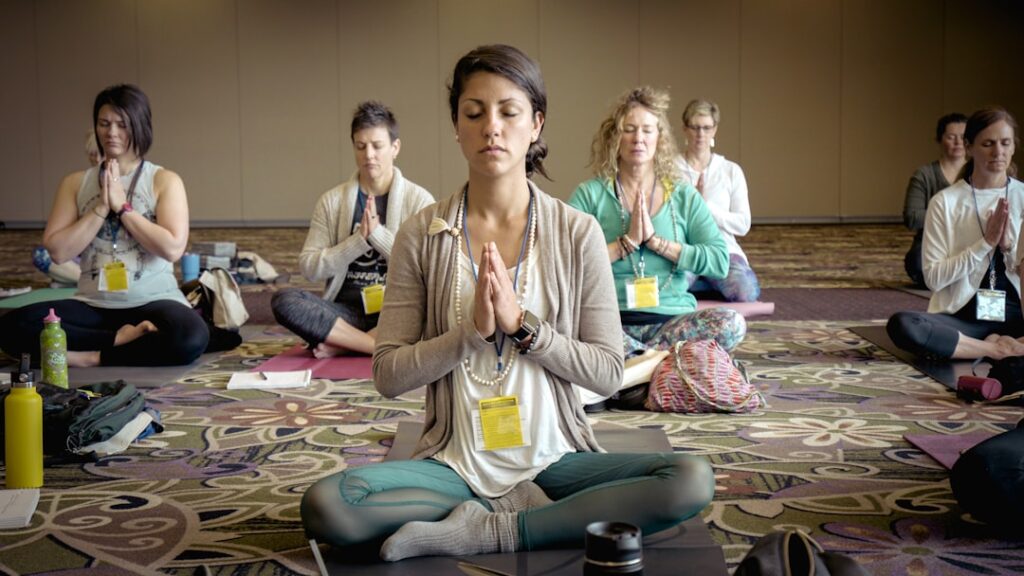Mindfulness is the practice of maintaining full awareness and engagement in the present moment without passing judgment. It involves consciously attending to one’s thoughts, emotions, physical sensations, and immediate surroundings. The core principle of mindfulness is focusing on current experiences rather than ruminating on past events or anticipating future outcomes.
This state of active, open attention to the present allows individuals to observe their thoughts and feelings without becoming entangled in them. Mindfulness serves as a method for training the mind to concentrate on immediate experiences, potentially reducing stress and enhancing overall well-being. While rooted in ancient Buddhist meditation techniques, mindfulness has gained widespread recognition in recent years as a secular approach to improving mental and physical health.
The practice can be applied to various activities, including eating, walking, and breathing. Mindfulness emphasizes full engagement with present experiences and the deliberate release of distractions. It can be practiced through formal meditation sessions or by bringing heightened awareness to routine daily activities.
Mindfulness represents a conscious approach to living, characterized by intentionality and attentiveness, as opposed to operating on autopilot. By cultivating mindfulness, individuals may develop enhanced self-awareness and improved emotional regulation skills.
Key Takeaways
- Mindfulness is the practice of being fully present and aware of the present moment without judgment.
- Practicing mindfulness can reduce stress, improve focus, and enhance overall well-being.
- Embracing mindfulness in daily life involves incorporating mindfulness into everyday activities such as eating, walking, and breathing.
- Mindfulness techniques include meditation, deep breathing, body scan, and mindful movement.
- Challenges in embracing mindfulness include distractions, impatience, and self-judgment, which can be overcome with patience and practice.
Benefits of Practicing Mindfulness
How to Embrace Mindfulness in Daily Life

Embracing mindfulness in daily life involves making a conscious effort to bring awareness to the present moment in all activities. This can be done through formal meditation practices or by simply paying attention to everyday tasks with intention and focus. One way to embrace mindfulness is by incorporating mindfulness meditation into your daily routine.
This can involve setting aside a few minutes each day to sit quietly and focus on your breath or bodily sensations. By making time for formal meditation, individuals can train their minds to be more present and attentive throughout the day. Another way to embrace mindfulness in daily life is by bringing awareness to everyday activities such as eating, walking, or even washing dishes.
By paying attention to the sensory experience of these activities, individuals can cultivate a greater sense of presence and appreciation for the simple moments in life. Additionally, practicing mindfulness involves being kind and non-judgmental towards oneself and others. This means accepting thoughts and feelings without getting caught up in them or criticizing oneself for having them.
By approaching life with an open and accepting attitude, individuals can cultivate a greater sense of peace and contentment.
Mindfulness Techniques and Practices
| Technique | Description | Benefits |
|---|---|---|
| Deep Breathing | Focusing on slow, deep breaths to calm the mind and body | Reduces stress, improves focus |
| Body Scan | Bringing attention to each part of the body, noticing sensations | Increases body awareness, reduces tension |
| Loving-Kindness Meditation | Sending love and compassion to oneself and others | Promotes empathy, reduces negative emotions |
| Walking Meditation | Bringing mindfulness to the act of walking | Improves concentration, reduces anxiety |
There are various techniques and practices that can help individuals cultivate mindfulness in their daily lives. One popular technique is mindful breathing, which involves bringing attention to the breath as a way to anchor oneself in the present moment. By focusing on the sensations of breathing, individuals can calm the mind and reduce stress.
Another technique is body scan meditation, which involves bringing awareness to different parts of the body and noticing any sensations without judgment. This practice can help individuals develop a greater sense of bodily awareness and relaxation. Mindful walking is another practice that involves bringing attention to the sensations of walking, such as the feeling of the ground beneath your feet or the movement of your body.
This practice can be done indoors or outdoors and can help individuals cultivate a greater sense of presence and connection to the environment. Additionally, loving-kindness meditation is a practice that involves cultivating feelings of compassion and goodwill towards oneself and others. By practicing loving-kindness meditation, individuals can develop a greater sense of empathy and connection with others.
Overcoming Challenges in Embracing Mindfulness
While embracing mindfulness can have numerous benefits, it is not always easy to incorporate into daily life. One common challenge is finding the time to practice mindfulness amidst busy schedules and responsibilities. However, it is important to remember that mindfulness does not have to be time-consuming.
Even just a few minutes of formal meditation or bringing awareness to everyday activities can make a difference. Another challenge in embracing mindfulness is dealing with distractions and wandering thoughts during meditation or daily activities. It is important to remember that it is natural for the mind to wander, and the key is to gently bring it back to the present moment without judgment.
Over time, with consistent practice, individuals can train their minds to be more focused and present.
Mindfulness and Inner Peace

The Path to Inner Peace
Mindfulness helps individuals develop a more positive outlook on life, reducing feelings of stress and anxiety. By being present in the moment, individuals can let go of worries about the past or future, and instead, focus on the here and now.
Self-Awareness and Emotional Regulation
Cultivating mindfulness also helps individuals develop a greater sense of self-awareness and emotional regulation. This means being able to recognize and manage emotions more effectively, leading to a greater sense of inner peace and well-being.
A Deeper Connection with Oneself
Overall, mindfulness can help individuals develop a deeper connection with themselves, leading to a greater sense of inner peace. By being more aware of their thoughts, emotions, and behaviors, individuals can make positive changes that promote emotional well-being and happiness.
Cultivating a Mindful Lifestyle
Cultivating a mindful lifestyle involves making a commitment to bring awareness to all aspects of life with intention and attention. This means being fully present in everyday activities, cultivating self-compassion, and approaching life with an open and accepting attitude. By incorporating mindfulness into daily routines, individuals can develop a greater sense of overall well-being and fulfillment.
One way to cultivate a mindful lifestyle is by setting aside time for formal meditation practices each day. This can involve sitting quietly and focusing on the breath or bodily sensations as a way to train the mind to be more present throughout the day. Additionally, bringing awareness to everyday activities such as eating, walking, or interacting with others can help individuals cultivate a greater sense of presence and appreciation for the simple moments in life.
In conclusion, mindfulness is a powerful practice that can have numerous benefits for mental, emotional, and physical well-being. By embracing mindfulness in daily life through various techniques and practices, individuals can develop a greater sense of self-awareness, emotional regulation, and overall well-being. While there may be challenges in embracing mindfulness, with consistent practice and commitment, individuals can cultivate a more mindful lifestyle that leads to inner peace and fulfillment.
If you’re interested in incorporating mindfulness into your daily life, you may want to check out this article on the benefits of using handmade bags as a mindfulness practice. Handmade Bag Shop offers a variety of unique and beautiful bags that can serve as a reminder to stay present and mindful in your daily activities. Whether you’re using a handmade bag for work, travel, or leisure, the act of choosing and using a handmade item can be a mindful practice in itself. Check out the article here to learn more about how handmade bags can enhance your mindfulness practice.
FAQs
What are mindfulness practices?
Mindfulness practices are techniques and exercises that help individuals focus their attention on the present moment, cultivate awareness, and develop a non-judgmental attitude towards their thoughts and feelings.
What are some common mindfulness practices?
Common mindfulness practices include meditation, deep breathing exercises, body scan techniques, mindful walking, and mindful eating. These practices are often used to reduce stress, improve mental clarity, and enhance overall well-being.
What are the benefits of mindfulness practices?
Research has shown that mindfulness practices can have numerous benefits, including reduced stress and anxiety, improved focus and concentration, enhanced emotional regulation, and increased self-awareness. These practices have also been linked to better sleep, lower blood pressure, and improved overall mental and physical health.
How can mindfulness practices be incorporated into daily life?
Mindfulness practices can be incorporated into daily life by setting aside dedicated time for meditation or mindfulness exercises, integrating mindfulness into daily activities such as eating or walking, and practicing mindfulness in moments of stress or difficulty. It can also be helpful to seek out mindfulness-based programs or classes to learn and develop these practices.
Are there any potential drawbacks to mindfulness practices?
While mindfulness practices are generally considered safe for most people, some individuals may experience discomfort or emotional distress when initially practicing mindfulness. It is important to approach mindfulness practices with an open mind and seek guidance from a qualified instructor if needed. Additionally, individuals with certain mental health conditions should consult with a healthcare professional before beginning a mindfulness practice.






